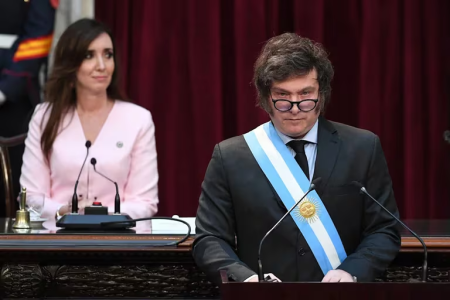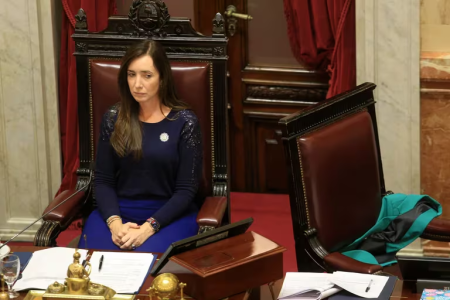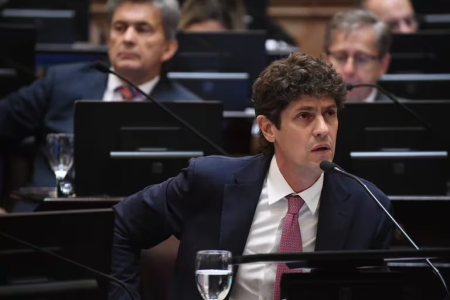All the Answers
Well-known member
Negotiations vote by vote in the Senate for the Bases Law: meetings against the clock and the scenario that the Government envisions - Infobae

Source:

Negociaciones voto a voto en el Senado por la Ley Bases: reuniones contra reloj y el escenario que vislumbra el Gobierno
El Ejecutivo trabaja para acercarse a los 37 votos y aprobar en general el proyecto. “Está apretado”, aseguraron ayer. No descartan cambios y que vuelva a Diputados. Definiciones en la UCR. ¿Avanza el Pacto de Mayo?
May 07, 2024
The Executive is working to get closer to 37 votes and generally approve the project. “It's tight,” they said yesterday. They do not rule out changes and returning to Deputies. Definitions at the UCR. Is the May Pact advancing?
By Federico Mayol

The Government works to approve the Bases Law before the May Pact
“This is week by week, nothing can be predicted,” said a Peronist senator last night, one of the 33 from the Kirchnerist PJ bench, after participating in the block meeting that had perfect attendance: good Some of the legislators from the interior rushed to fly to Buenos Aires on Sunday, at the beginning of a decisive week for the Upper House. “If they do not accept the changes, it is rejected ,” added the senator after 9 pm after the meeting in which a forecast for now reserved was drawn up around the objective proposed by the Casa Rosada, which is working against the clock to reach the final sanction. of the Bases Law project and the fiscal package in view of the promoted Pact of May 25, and thus be able to give a signal of political predictability that is demanded from the red circle to the Monetary Fund.
This Monday, the phones between the Senate and the Casa Rosada had greater congestion. “They started calling ,” confided a senator who does not refer to his governor and who, according to Javier Milei's collaborators, could accompany the Executive, at least in the general vote. In advance of the start of the discussion this Tuesday in the plenary session of commissions, a 72-hour raid that the ruling party wants to culminate on Thursday with the signing of an opinion to bring the project that already had half a sanction in Deputies, contacts between libertarian operators and leaders and the Upper House intensified.
From senators Ezequiel Atauche and Bartolomé Esteban Abdala, to Martín Menem, the president of the Chamber of Deputies who activated some contact, and Minister Guillermo Francos , who will go to the plenary session of commissions this Tuesday to defend the project. Accompanying Victoria Villarruel , the vice president, who does not want to take any false steps after the negotiation that she led almost alone regarding DNU 70 rejected in March by the opposition in the Senate. Supervising with particular attention from the superstructure is strategist Santiago Caputo , in charge of the negotiations in Buenos Aires while the Milei brothers continued their tour of Los Angeles yesterday.

The Government is working on the agreements to approve the Bases Law Photo NA: DAMIAN DOPACIO
“The outlook is tight ,” a high official source participating in the negotiations said last night. There was, however, a moderate illusion of approaching the magic number of 37 senators in these hours, the one necessary to sanction the project, at least in general. “With general approval, we advance to May 25,” official sources added.
The fact is that, in the roadmap drawn up by the Casa Rosada, the possibility of the Senate introducing modifications to the half-sanction of Deputies began to materialize with increasing force. In the vote in particular, in chapters such as the delegation of powers, Profits or the Large Investment Incentive Regime (RIGI), questioned by sectors of the opposition, despite the consensus of a large part of the governors.
There is, in that sense, a legal and parliamentary device in which, in that context, the government could leverage itself to insist on the half-sanction voted in Deputies: if none of the potential changes in the Senate are introduced with two-thirds of the legislators , the Executive could advance with the text approved in the lower house with a simple majority.
The truth is that, until that point, there are still hours of negotiations left.
Last night, the president's collaborators detailed in the official list a number around 35 senators who, in principle, could accompany the Base Law. 36, according to the most optimistic. Among them, in addition to the six senators from the PRO and the seven from La Libertad Avanza, the three from Salta, two from Santa Cruz, the same from Misiones, one of the senators from Río Negro, from Neuquén, and the bulk of the block of the Radical Civic Union, with a huge question mark about Martín Lousteau , the president of the national committee, who, despite mutual distrust, began to weave a rapprochement with Facundo Manes . Last Thursday, the senator shared an event with his brother Gastón. Yesterday, the neuroscientist posted on his networks: “The same people who already went after Kirchnerism and Macri, now want to go after Milei.”
At the UCR, as of yesterday, an organic position had not yet been formalized. “We want to fulfill the role of reviewing chamber ,” they tried to revalue themselves these days. The idea of being a clerk for the Executive did not arouse much sympathy. Late this Tuesday, once the first day of the debate in committees ends, the block of senators in that space plans to meet with their governors to learn first-hand what the government had offered so far in exchange for radicalism. collaborate with the project that is being discussed in the upper house.

Martín Lousteau will be a key player in the Senate to achieve the votes to approve the Law
Because if until yesterday from the Casa Rosada itself they recognized a much less comfortable scenario than in the case of the vote in Deputies, near Milei they accepted that, unlike the summer, when the first draft of the Bases Law was shipwrecked, this time the Executive had arranged otherwise. “We may be liberal, but we are not idiots,” they highlighted.
Over the weekend, in the Kirchnerist Peronist bloc of 33 senators - it was only divided into two groups, 17 and 16, in the maneuver to take advantage of the integration of the Judicial Council - versions of possible leaks circulated in favor of the government. Yesterday, after the meeting of the Peronist bench, it emerged that this possibility was diluted, despite some rumors that still weighed on legislators such as Sergio Uñac from San Juan or the senators from Santiago del Estero referenced in Gerardo Zamora.
On Sunday, in his role as host at the stadium that hosted the final of the Soccer League Cup between Estudiantes de La Plata and Vélez, the governor made it clear that he was not willing to negotiate the vote of those three senators. “They are closed, they don't want to accompany,” explained a senator from the interior.
The magnifying glass, for example, was still focused last night on the three senators from the Federal Unity bloc: Carlos “Camau” Espínola, Edgardo Kueider and Alejandra Vigo. None of them appeared in the Casa Rosada count at this time. Despite, in some cases, confusing signals even with their own environment.
On Thursday, the Government will seek to obtain an opinion to bring the project to the premises as soon as possible. Kirchnerism will try to obstruct that objective. This Tuesday, in that context, the meeting that a CGT delegation intended to hold with a group of Kirchnerist Peronist senators took shape in the run-up to the general strike this Thursday, which yesterday added the support of the UTA so there will be no neither train nor bus service. A complexity for the transfer of employees of the Upper House. And an extra dose of tension in decisive hours for the future of the Bases Law.
This Monday, during the assemblies that ratified the strike this Thursday, one of the unionists in the aeronautical sector warned that they would criticize the senators who voted in favor of the project. A low-flying threat, of little representation. Incomparable, for example, with the crisis of 2001 and the era of “let everyone go” that motivated professional leaders like Miguel Ángel Pichetto to refuse to fly for years on commercial airplanes for fear of social reprimand.

